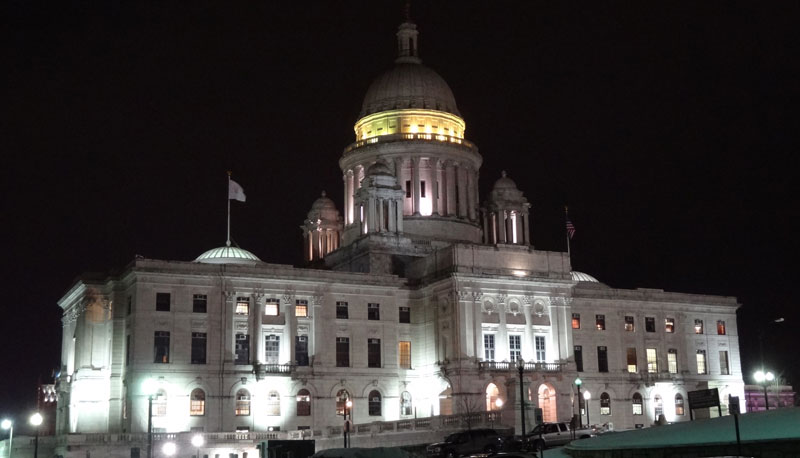No Cost Projections or Means Identified to Achieve Rhode Island’s Green New Deal
The innocently named “2021 Act on Climate”, H5445, has been ominously rocketing through the General Assembly. It passed the full House on March 23 and the full Senate is scheduled to vote on it this afternoon. If it passes, it will have cleared the General Assembly and presumably be sent straight on to Governor Daniel McKee for his action within seven (ten?) days.
Informally dubbed “Rhode Island’s Green New Deal”, H5445 would mandate the reduction to zero by 2050 of greenhouse gases in Rhode Island – a goal that could only be accomplished by eliminating the use of all fossil fuels and transitioning entirely to renewable energy sources, wind and solar; i.e., from reliable, reasonably priced energy sources to intermittent, exorbitantly expensive ones. More about it here, including why the effective date of substantial implementation would be 2026, not thirty long years from now.
But perhaps we are missing something. Have proponents of the bill answered the critically important question about cost of implementation? A search of news reports about the bill turns up no cost projections, only statements by proponents minimizing or dismissing the matter of the cost of such a radical transition of energy sources.
Accordingly, the Ocean State Current reached out to National Grid, to Governor Daniel McKee and to the prime sponsor of H5445, Representative and Deputy Majority Leader Lauren Carson, to ask about prospective cost projections, and whether they had even been undertaken, of implementing H5445. Neither National Grid nor Governor McKee responded to the query. Leader Carson responded promptly:
Thank you for your note.
Since there is no plan yet, there are no projected costs.
The legislation will mandate a plan and we will all have a chance to comment on it during the public process required by the legislation.
So those who propose we make a seismic change to our energy supply – and a completely pointless one because proponents also offer no science or evidence that H5445 would have the slightest impact on climate change – have compiled no estimates about what it would cost Rhode Island residents and businesses to make this monumental shift.
Proponents of the bill cannot, or decline to, identify how net zero emissions would be achieved. They note that a non-elected “Climate Change Coordinating Council” would be comprised of “experts” who would identify the means. In fact, the “Climate Change Coordinating Council”, which would be given extraordinary power to get us all to net zero emissions come hell or high water, would be comprised of fourteen state agency heads. And while they may be experts in their respective fields, what would be needed is experts on energy. Two out of the fourteen listed agency heads might potentially have expertise in energy; the balance do not.
But wait, National Grid is an expert on energy, right? Perhaps they can shed light on the matter. While their press team and a company official declined to respond for this article, a search turned up a public statement from October titled “National Grid Releases Net Zero by 2050 Plan”.
But this is a misnomer; it isn’t really a plan. It lists ten “areas of focus”; first three listed below for flavor.
Reducing demand through energy efficiency and demand response;
Decarbonizing the gas network through use of renewable natural gas and hydrogen;
Reducing methane emissions from our own gas network while working with the industry to reduce emissions through the entire value chain;
These are goals in themselves, not means. In fact, the president of National Grid acknowledges in the statement
“Our Net Zero by 2050 Plan outlines our approach to exploring a wide range of solutions until we can deliver the affordable, reliable clean energy future our customers want and deserve – no later than 2050,” said Badar Khan, President, National Grid US. “We don’t have all the answers yet, and the path to both increase renewable energy and decarbonize heat will be challenging. We believe our electric and gas networks have a vital role in helping achieve net zero emissions and our announcement today is the beginning of a transformative journey of our business.”
So EVEN THE ENERGY EXPERT cannot identify how it can achieve net zero greenhouse gases, much less put a price tag on it.
In a vacuum of knowledge about whether and how net zero emissions can be achieved at a reasonable cost and without destabilizing the electrical grid, the passage and implementation of H5445 would be an energy suicide pact. If this is your conclusion also, click here to ask Governor McKee to veto H5445 and legislators to uphold his veto or call the governor at 401-222-2080.
Monique is a political gadfly, data junkie and contributor to the Ocean State Current and Anchor Rising. Please consider supporting the terrific work of the Rhode Island Center for Freedom and Prosperity here:
https://secure.piryx.com/donate/7rkChZKP/RI-Center-for-Freedom-and-Prosperity/




